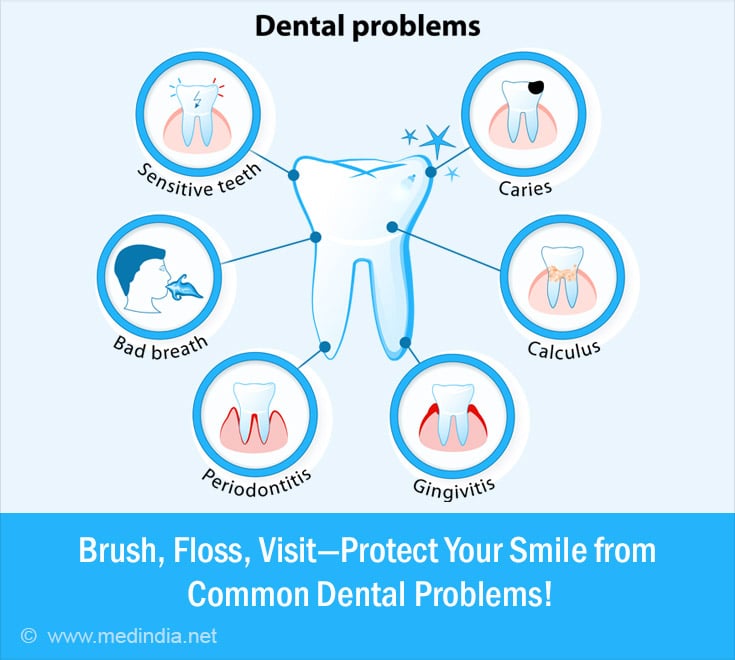- Common Dental and Periodontal Diseases - (https://pubmed.ncbi.nlm.nih.gov/32892850/)
Taking care of teeth is very vital to personal health, but this is not considered until we personally experience an excruciating toothache. Most dental problems are regular occurrences that affect every age due to several factors including genes as well as oral hygiene practices (1✔ ✔Trusted Source
Common Dental and Periodontal Diseases
Go to source).
Did you know?
Over 90% of adults experience cavities at some point in their lives! #medindia #dentalcare
Common Dental Problems
Learn about the most common dental problems to improve your oral health and prevent future issues.
1. Bad Breath (Halitosis)
In 85 percent of the instances, chronic bad breath is linked to gum disease, cavities, dry mouth, or build-up of bacteria on the tongue. Halitosis may also be associated with other ailments such as oral cancer, or other systemic illnesses. Although the smell may be masked by the mouthwash, it does not cure the problem.
Dental care and proper brushing and flossing as well as tongue cleaning will help deal with the problem.
2. Tooth Decay
Cavities are among the most recognized problems people face throughout their lives and all over the world. It develops when bacteria in the plaque use sugars as well as the starch in the food the individual takes to generate acid that dissolves the enamel part.
If not treated early enough, cavities may cause discomfort, in addition to bacterial infection and ultimately extraction. If you brush your teeth every day, floss, and consume as few sweets as possible, you could also get a fluoride treatment to help avoid this. Those with severe cases may require fillings, crowns, or root canals in order to restore the damaged tooth.
3. Periodontal /Gum Disease
Gingivitis is an inflammation of the tissues around the teeth. Gingivitis, in the early stage, causes gum inflammation and sometimes bleeding. If not treated it develops into Periodontitis that affects the supporting alveolar tissue surrounding the teeth and may cause tooth loss.
Other causes are associated with poor dental hygiene, smoking, high blood sugar levels, or hormonal imbalances. Cleanings for early stage, antibiotics for moderate cases, and sometimes surgery for of advanced periodontitis is prescribed. Gum disease can be avoided or its progression slowed by good hygiene and regular visits to the dentist.
4.Oral Cancer
Oral cancer involves lips, tongue, throat, and any other part of the mouth, it is a dangerous disease that may cause death. The potential risk factors include tobacco use, alcohol, HPV, and poor diet. These may be sores in the mouth, lumps, white or red areas in the lining of the mouth, and difficulty in tongue or jaw movement. One of the problems with oral cancer is, that the signs may not be felt until the disease is in its later stages. Dental check-ups must be carried out often as dentists are able to identify signs at an early stage and the chances of treatment success increase.
5. Mouth Sores
It is well known that mouth sores are not rare and may be caused by different agents. Some common types of mouth sores are:- Canker Sores: This is also known as Aphthous ulcers. Everyone gets these small, painful sores that develop inside the mouth and are not contagious. These ulcers could caused due to stress, consumption of acidic foods, or minor injuries.
- Cold Sores:Cold sore usually occurs on the lips it is contagious. This is due to the herpes simplex virus. The signs they display can be treated using antiviral drugs.
- Thrush: A fungal infection of the mouth, commonly noticed in infants and elderly people with dentures and those with a compromised immune system.
Usually, simple ulcers are controlled within two weeks. However, the ones that persist for more than two weeks should be reported to a dentist.

6. Tooth Erosion
Tooth erosion is the dissolution of the external layer of the tooth, the enamel. It can be caused by an excessive intake of acidic foods and beverages, acid reflux, or some medicines. Some of the symptoms include an enhanced sensitivity to hot and cold food and drinks, discoloration of your teeth, and rounded or worn tooth edges.
With the advancement in erosion, it is bound to cause cracks, chips, and severe sensitivity. Prevention involves avoiding such foods, when taking foods and drinks with high acidic content, it is advisable to use a straw and practice good dental hygiene. Fluoride treatments and bonding agents are applied on the enamel for management.
7. Tooth Sensitivity
Sensitivity is characterized by stinging pain when the tooth is subjected to hot or cold food and beverages, sweets, acidic foods, cold air, etc. They may result from deterioration of enamel, retraction of gums, or some general concerns such as cracks and caries.
It may also be induced by methods such as brushing hard or the use of bleaching products on the teeth. Dentists may use certain agents that reduce sensitivity, by prescribing desensitizing toothpaste which reduces sensitivity and relieves pain. When sensitivity is caused due to decay or gum disease, the pain can be eased if the conditions are treated appropriately.
8. Root Infections
Abscesses or root infections are caused when the pulp, which contains nerves and blood vessels, is infected by tooth decay or an injury. If untreated, an abscess may cause the spread of infection to the surrounding tissues and even the jaw bone. The conventional procedure is still the root canal treatment where the infected tissue is cleaned out and a filling is made. Endodontics or root canal treatments are effective to cure the pain and save the tooth.
9. Teeth Grinding (Bruxism)
Bruxism is the habitual grinding of the teeth and this is not just at night but during sleeping hours and in other cases; during stress-provoking situations. This puts a lot of force on the teeth and the jaw which causes cracked teeth, wear out of the enamel, and pain in the jaw.
The symptoms of bruxism are headaches, earache, and an inability to open the mouth properly. Wearing a night guard can help protect the teeth from grinding damage. Practical advice includes: practicing relaxation, using CBT methods, and staying away from caffeine.
10. Temporomandibular Joint Disorders
TMDs (Tempero Mandibular Disorders) impact the functional movement of the jaws through the Temporomandibular Joints (TMJ) that are required in chewing, speaking and swallowing. This disease is characterized by pain while opening the mouth, cracking sound, and restricted mouth opening.
TMD can be caused by arthritis, a jaw injury, or a misalignment. Therapies involve exercising the joint and surrounding muscles, anti-inflammatories, and if the symptoms are severe surgery may be advised. Other tools such as a mouth guard also help in relieving pressure put on the jaw and the muscles. TMD symptoms can be reduced by avoiding stress and gum chewing etc.
Most of the simple dental ailments may be averted if society practices a proper hygiene regime and undergoes regular dental check-ups. If you wish to stay free from any oral diseases then, you must brush your teeth at least twice a day or even floss, stop using any tobacco products, and get any abnormal symptoms ruled out by a dentist as soon as it is detected.









